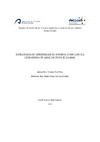Identificador persistente para citar o vincular este elemento:
https://accedacris.ulpgc.es/jspui/handle/10553/106063
| Título: | Estrategias de aprendizaje de español como lengua extranjera en adolescentes búlgaros | Autores/as: | Tate Pérez, Kim Yvonne | Director/a : | Cáceres Lorenzo, M. Teresa | Clasificación UNESCO: | 5701 Lingüística aplicada 570111 Enseñanza de lenguas |
Fecha de publicación: | 2021 | Resumen: | Our initial purpose is to investigate how Bulgarian adolescents use learning strategies with the following study variables: age, gender, origin, mother tongue, knowledge of other languages, their level, use, cut-off mark to access their study at the Institute and if they like to study Spanish, as well as why, as a contribution to learning Spanish as a foreign language in Southeastern European contexts, who have a long tradition of learning foreign languages, due to their historical conditions, which It has led them to a strong presence of learning them, with various language policies throughout their political and economic development up to the present, as members of the European Union. We also questioned the presence of the Internet with its respective tools through action-based research. Reflection on communication circuits becomes increasingly relevant due to the emergence of these new information and communication technologies in society and in the didactic process. The educational act is above all an act of communication in which the information channels play an important role in its configuration. To achieve this, we have carried out several surveys of 202 adolescent students who continue their training within the study system of the Republic of Bulgaria in which they study a specific secondary language, in a regulated way, whose first foreign language is Spanish, and Bulgarian students of one General secondary school, also regulated, with a second foreign language, which is Spanish, during the 2018/2019 academic year. For this design, the previously published bibliography has been taken into account, the general purpose of which is to know how young learners of the 21st century learn successfully. The results show that Bulgarians agree with those of other countries in that the main factors associated with the general performance of learning ELE in this study show that those students who are confident in their ability to learn the language and accept responsibility for planning their learning, perform well in performance tests. This suggests that ELE instruction should address students' metacognitive beliefs and strategies so that they realize that they have the ability to learn the language well and implement effective strategies, such as setting goals, thinking of appropriate actions, and persevering in subsequent tasks. | Descripción: | Programa de Doctorado en Estudios Lingüísticos y Literarios en sus Contextos Socioculturales por la Universidad de Las Palmas de Gran Canaria | URI: | https://accedacris.ulpgc.es/handle/10553/106063 |
| Colección: | Tesis doctoral |
Visitas 5
443
actualizado el 27-ene-2024
Descargas
2.285
actualizado el 27-ene-2024
Google ScholarTM
Verifica
Comparte
Exporta metadatos
Los elementos en ULPGC accedaCRIS están protegidos por derechos de autor con todos los derechos reservados, a menos que se indique lo contrario.
